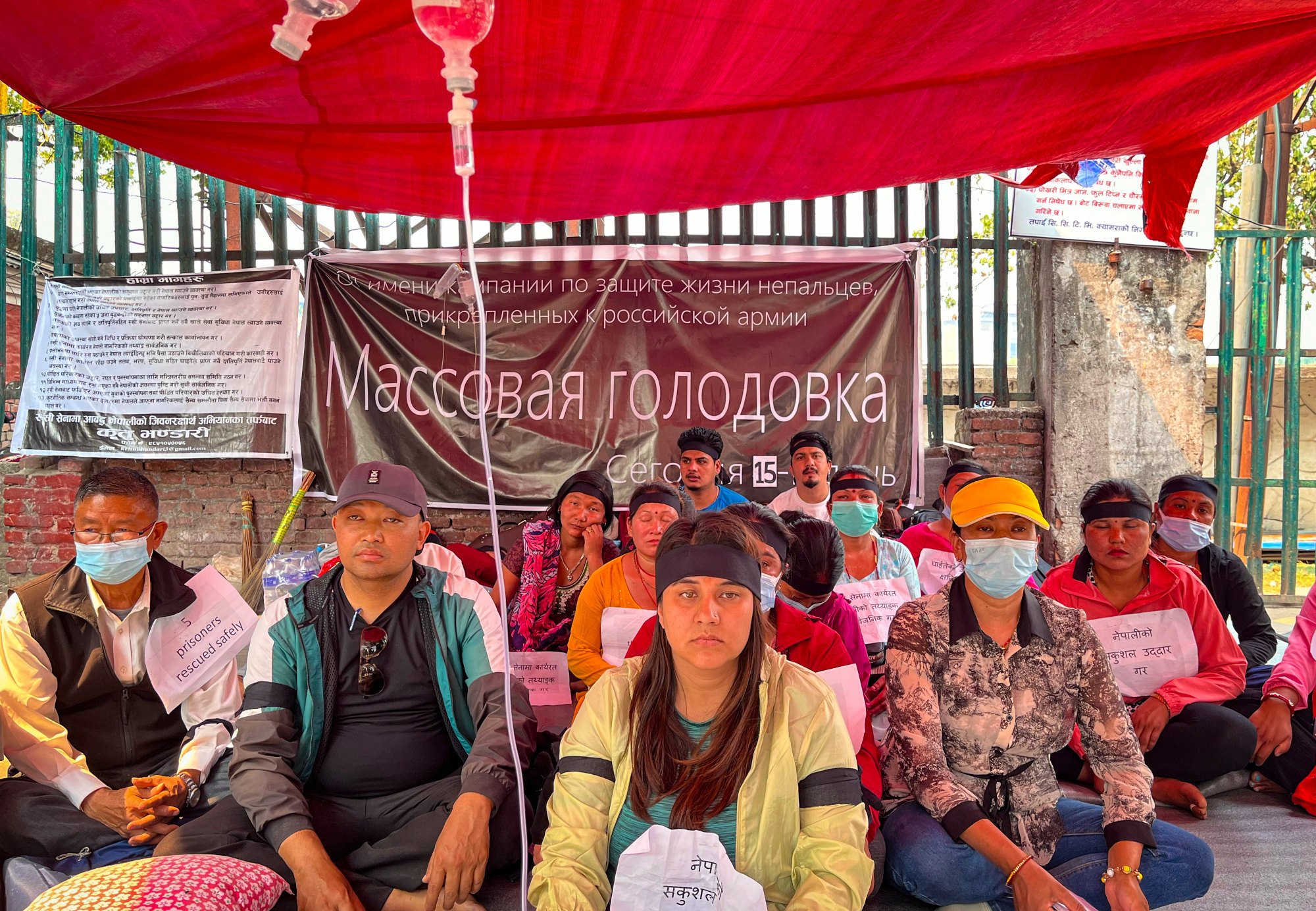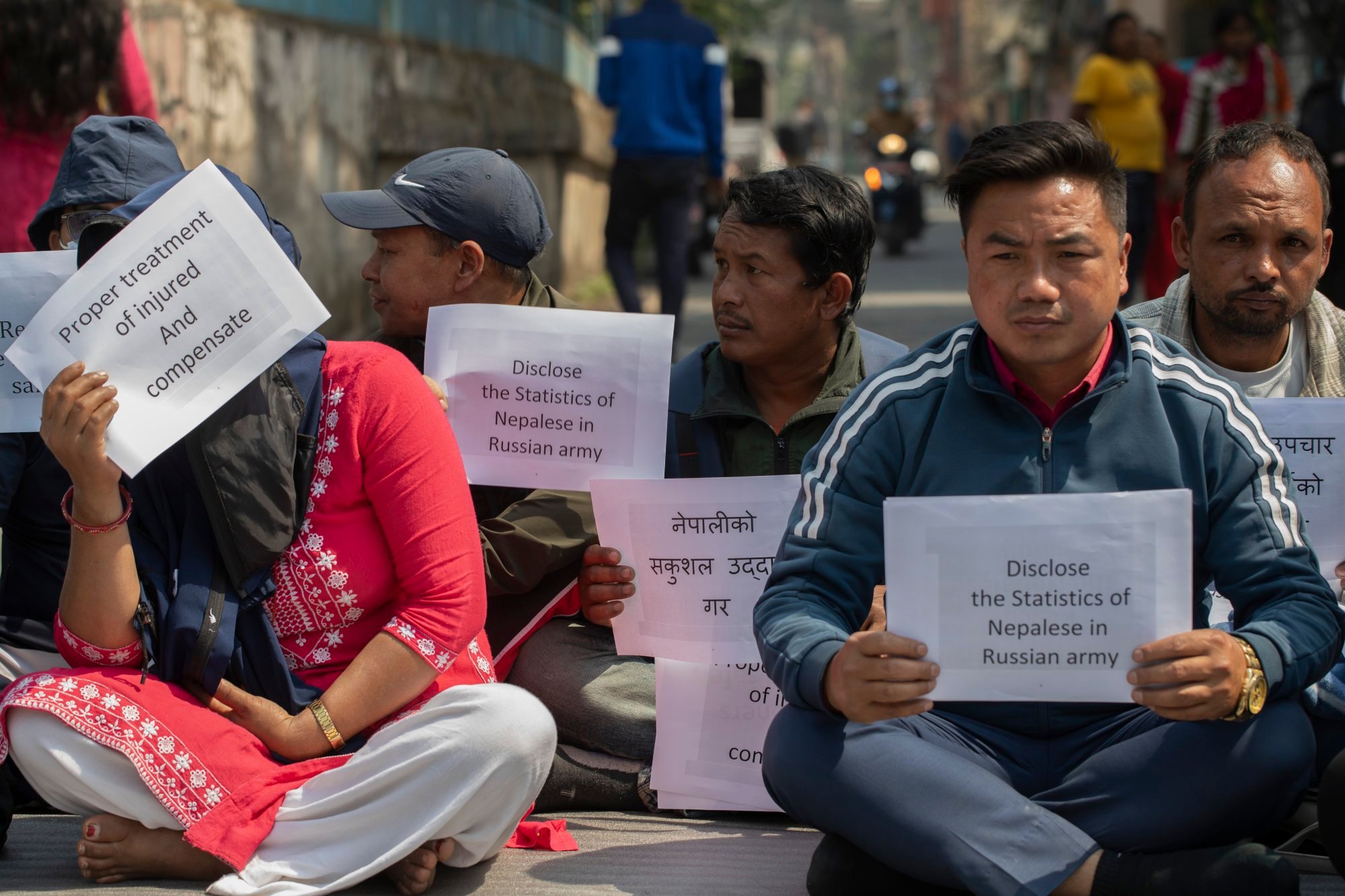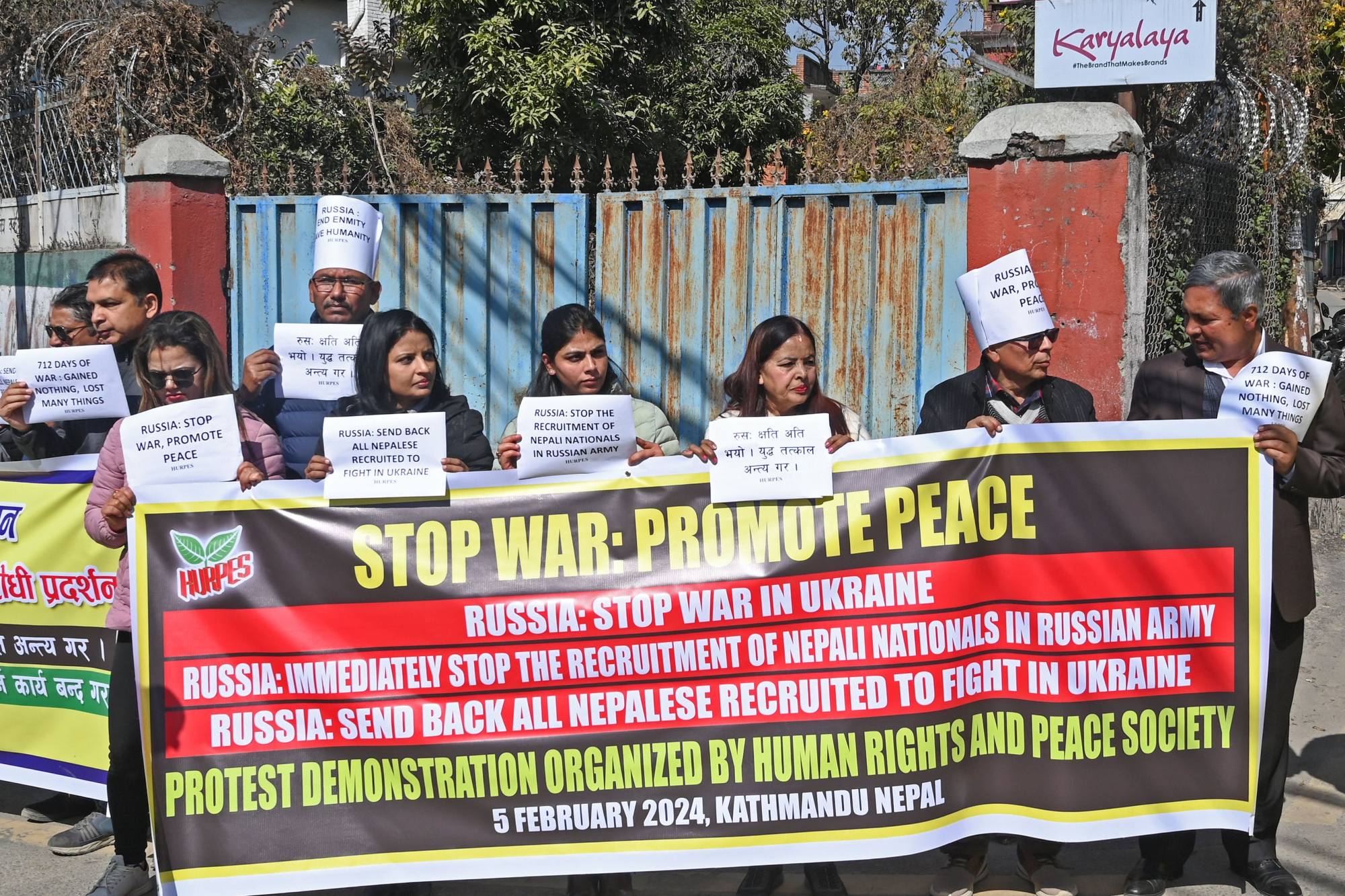Families of Nepali mercenaries fighting for Russia in Ukraine war pressure government for their rescue: ‘hope is all we have’
In November, Rajendra Kapri’s son joined hundreds of Nepali men fighting for Russia in the war against Ukraine. But 22-year-old Gautam has not contacted his family for almost three months now.
Kapri has since travelled over 100km (62 miles) from Dhading, where he lives, to Nepal’s capital Kathmandu several times hoping for answers, but to no avail. He then joined a peaceful protest with dozens of other families demanding a concrete government response toward ensuring compensation for those killed in the war and rescuing others.
Family members protested twice outside the seat of the government, and once outside the Russian Embassy, from where many of them were detained by police for protesting in restricted areas. Wearing black head bands as a sign of protest, they also set up an encampment in Ratna Park, one of Kathmandu’s busiest intersections.
The 17-day protest ended on Sunday after the government assured them that their demands would be addressed.
“We are just baffled why the government hasn’t listened to us,” Kapri told This Week in Asia from the protest site on Friday.
“Considering that there are so many families wanting answers about their missing relatives, the government should have been proactive.”

A statement from the Office of the Prime Minister & Council of Ministers on Sunday night said the government is committed to addressing the protesters’ demands through diplomatic channels, which the authorities have been promising for months.
The reason hundreds of Nepali men ended up fighting for Russia is because they paid “agents” hefty sums to be recruited by Moscow’s military for monthly salaries at least six times more than the US$130 minimum wage in their homeland.
Many were also driven away by a lack of employment opportunities at home.
While some were aware of the risks and joined voluntarily, others said they were tricked into going to the frontline after being promised cooking and cleaning jobs with the army.
There is no official data on the number of Nepali mercenaries in the Russian army, however those who have fled and are still in Russia claim there are about 8,000 to 14,700 of them and hundreds have died.
Nepali authorities say they are in contact with only over 200 families whose relatives are serving in the Russian army and have confirmed at least 19 deaths, with five Nepalis also in Ukraine as prisoners of war.
A campaign by families and local politician Kritu Bhandari, however, said they have collected details of nearly 700 men serving in the Russian army, though they believe the number could be higher. Of them, 39 have been killed and the death of 40 others are pending confirmation, while some 117 are injured and 272 missing.
“We have pleaded to leaders of political parties and many ministers but only received sympathetic words saying they will act on it,” said Bhandari, who was one of three protesters who went on a hunger strike. “So it was important for us to get to the streets to make our voices heard and bring our citizens back.”
Many Nepalis took hefty loans to fly to Russia in the footsteps of their friends and relatives, or after watching TikTok videos lauding the military life. Now they are seeking to escape or have made a risky journey home after paying agents hundreds of thousands of Nepali rupees.
Shova Rai, who was at the protest, said her brother-in-law Madan Kumal, 24, along with two other men, had fled their military base but were caught by army officials before boarding a plane in Moscow in February.

Kumal, a former member of Nepal’s army, in October paid 900,000 rupees (US$6,750) to go to Russia without telling his family.
“The last thing he said after being arrested was that they were sending him to the battlefield again, and he is contactless now,” Rai said.
In December, Nepal’s foreign minister requested Russia stop recruiting its citizen into the military. The following month, Nepal halted issuing work permits to Russia, with few exceptions, while the Russian government in February agreed to compensate Nepalis killed on the frontline.
However, the families of the deceased have yet to receive the promised compensation, said to be around 7 million rupees. In March, Nepal’s newly appointed Foreign Minister Narayan Kaji Shrestha said he had raised the issue with his Russian counterpart and the Russian foreign ministry had, “in principle”, agreed to terminate the military contracts of Nepalis wanting to return.
The desire to earn ‘easy’ money has turned into a trap for Nepali mercenaries, with no safe way out
Earlier this month, Ukraine’s Ministry of Defence said Nepali mercenaries from one of the Russian army units had deserted en masse, and Russian military were hunting them in the occupied Luhansk region. They reportedly fled due to poor treatment from their commanders, unpaid wages and heavy losses on the battlefield.
“The desire to earn ‘easy’ money has turned into a trap for Nepali mercenaries, with no safe way out,” the Ukrainian ministry statement said.
Nepal’s government has time and again been accused of being apathetic to urgent issues of public concern, from taming raging wildfires to curbing hazardous air pollution to helping citizens in distress. The government has also faced criticism for not doing enough to release Bipin Joshi, a Nepali citizen captured by the Hamas militant group after the October 7 attack in Israel.

Narayan Adhikari, South Asia representative of the non-profit Accountability Lab, said the government has not prioritised the issue of Nepalis joining the Russian army nor has it become a topic of extended discussions in parliament. He said civic society has also not been vocal enough, leaving the already traumatised families on their own.
“It’s a serious crisis,” he said. “If the government is transparent about the numbers of Nepalis serving in the Russian army and those killed, perhaps it would be a warning for others to not join. There needs to be a meaningful effort to bring back our citizens, and there should be more voices joining the families that are fighting for justice.”
Though the families have ended their protest, they are determined to keep pressing the government. They hope that the authorities will keep their promise and punish those who duped their loved ones into fighting a foreign war.
“The government has approached Russia before, too, but ours is a small country so it seems like our voice is lost,” Kapri said after hearing the government statement on Sunday.
“But we are hopeful because hope is all we have.”


